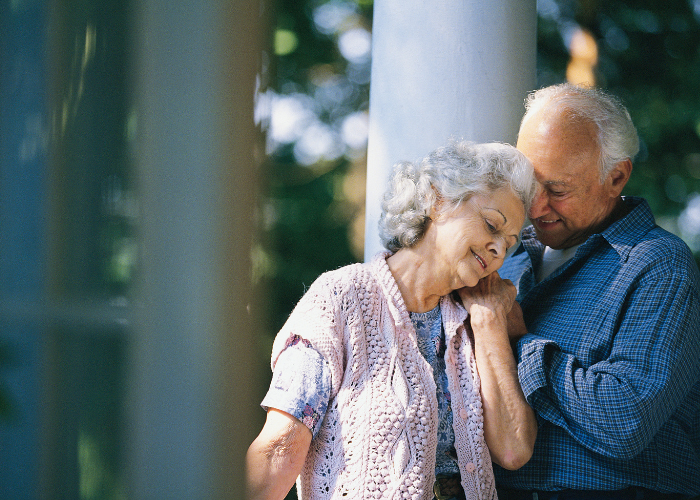
One of every two Australians will be diagnosed with cancer by the age of 85. We know that increased age is one of the highest risk factors for cancer development. To mark International Day of Older Persons on October 1st, we look at the reasons why.
Cancer is often considered an age-related disease because the incidence of most cancers increases with age, rising more rapidly beginning in midlife.
The process of aging shares mechanisms with cancer development. To explain that further, as we age, cell damage accumulates. Our exposure to things like the sun and other toxins increases over time, and so the older we get, the higher the incidence of genetic instability and harmful mutations (gene errors). When we are young, our immune system is very strong, and it is able to target those cells and kill them, but as we age, so does our immune system and so it becomes less able to protect us as it once did.
Although we can’t stop the aging process, there are other ways to reduce the risks. Not smoking, exercising, and watching our diets and alcohol intake are habits we should all adopt, regardless of our stage of life.
How does ageing affect a person’s response to cancer treatment?
Both cancer care providers and patients face challenges because of the high incidence of comorbid conditions (heart disease, vascular disease, diabetes and chronic kidney disease), physical and cognitive functional impairment and socioeconomic factors in ageing patients, all of which vary widely among people of the same age, so it’s not a case of one-treatment-fits-all.
When considering treatment in older patients, an important goal is to maintain independence and quality of life - things like physical comfort, nutrition and the ability to continue with usual activities.
Treatments need to be personalised with these factors in mind. Managing side effects from treatment can make a difference to your quality of life, so this is something that should be discussed with healthcare teams. Response, as well as short- and long-term outcome will vary depending on the patient’s specific circumstances.
Before making any treatment decisions, patients should consider all their treatment options alongside any associated risks and benefits. Cancer treatment can affect your physical and emotional health , as well as your lifestyle.
Advancements In Treatment For Older Patients
There have been some fantastic advances in cancer care in recent years, meaning many patients who are diagnosed in midlife are going on to live long, full lives despite having cancer. New treatments like immunotherapy mean that older adults can live with certain types of cancers that were previously considered deadly for many years.
Cancer specialists are increasingly focusing on patient-centred care and using multidimensional geriatric assessment measures of fitness, frailty and vulnerability. Collaboration with Geriatricians is becoming much more commonplace, which means more personalised and quality care can be provided to older adults.
Prediction of treatment tolerance and benefit as well mitigating risk and improving resilience have led to improvement of care during treatment. There is also an increasing commitment to include older adults in clinical trials, including those with other conditions.
Cure Cancer funded researcher Dr Mark Adams, a lung cancer researcher at Queensland University of Technology, is currently involved in the QUT Cancer and Research Program; a comprehensive cancer research initiative that brings together internationally regarded research teams of surgeons, clinicians and basic scientists to solve two key questions: why do we age, and why do we get cancer?
They predict that by 2030, half of all global deaths will be from cancer. Their research has identified a key protein that is increased in all cancers they have studied, including breast, pancreatic, lung and colorectal cancer. When this protein is blocked, they have found that the cancer cells die.
The CARP team are currently working towards understanding how this protein functions in cancer and are developing new drugs to target its function. They are aiming to bring one of these drugs to the clinic to treat patients within the next three years.
The same protein is also linked to other proteins that are important in ageing. In exciting early experiments, they have been able to change the activity of some of these proteins that may delay the aging process.
Does Being An Aged Care Resident Affect Cancer Diagnosis Or Treatment?
Although it’s unlikely to affect diagnosis or treatment, cancer patients living in aged care facilities will require a specific program of palliative care .
For a patient to cope as well as possible, the care offered should involve a range of services offered by medical, nursing and allied health professionals, as well as volunteers and carers. All of these can and should be offered alongside other cancer treatments.
This sort of multidisciplinary team can help people with advanced cancer to live as fully and as comfortably as possible; identifying and supporting the resident’s specific needs from the point of diagnosis onwards.
How can aged care nurses and other frontline workers support aged care residents through cancer diagnosis, treatment and prevention?
Caregivers should look to identify and help manage the physical, practical, social and emotional needs of the resident to help them achieve the best quality of life for as long as possible.
This can be a time of great stress and fear, so it’s important that anyone caring for an older adult with cancer helps them to feel in control of their situation. A key part of this would be in supporting them and their families with decisions regarding their treatment and ongoing care, and ensuring the care plan is tailored to suit the resident’s specific physical and emotional needs.
To ensure vital cancer research can continue, make a donation to Cure Cancer today: DONATE